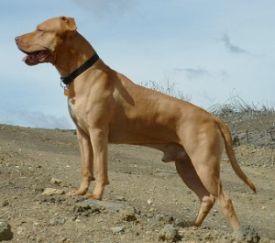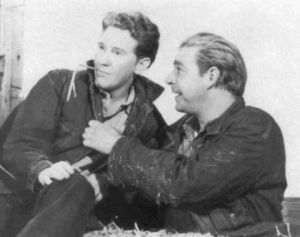Freddy was not my dog; I mean, I didn’t own him. We had not arrived at any such contractual arrangement. I can’t imagine that I could have made the terms attractive enough for him, and I don’t think the nature of our relationship would have benefitted in any case. Rather, he sort of came with a house I lived in for a while. He advised me, within the first day or two of my arrival, that I would be providing him meals from time to time when he was not able to procure them for himself. He would be providing cultured company and alerts, should they be needed, upon the arrival of visitors to our midst.
Judging by his tail and ears, Freddy must have been a distant offshoot of the terrier clan. Not big, not small, his curly tail rather circulated than wagged. Mostly white with a few black and tan spots, he was trim and struck a fine figure, with an intelligent gaze and bearing. In addition to his fine appearance, he proved to be an accomplished diplomat, always finding a way around conflict with his fellow canines. He was equally at ease with people, self-sufficient and, unlike so many other dogs, never needy.
Everyone seems to think they have the smartest dog ever minted, even when that clearly is not the case. I wonder if dogs are more realistic when assessing the intellect of their human companions. I believe Freddy may have downplayed intellect as one of my redeeming characteristics when discussing me with his friends. If so, it is only because I may have disappointed him from time to time. For example, when he got excited about something, he often came to me to get my view and perspective. Just as often, he left frustrated having been unable even to begin the discussion, myself, being as I am, so dim. Yet he must have found a few redeeming qualities because he stayed and stayed.
 Once, on a trip to the Everglades and the Florida Keys, he found occasion to see that I might be of some small use after all. We had stopped at a little park on one of the minor keys (sorry for that one). We walked back into some undergrowth until we found a little pond, less than 30 yards across with fairly steep banks all around. Freddy was not native to those climes and had never seen an alligator, but there was one in the middle of the pond that most certainly had seen little dogs before and had grown quite fond of them.
Once, on a trip to the Everglades and the Florida Keys, he found occasion to see that I might be of some small use after all. We had stopped at a little park on one of the minor keys (sorry for that one). We walked back into some undergrowth until we found a little pond, less than 30 yards across with fairly steep banks all around. Freddy was not native to those climes and had never seen an alligator, but there was one in the middle of the pond that most certainly had seen little dogs before and had grown quite fond of them.
 The dog turned out to be quite a specimen–affable but quite imposing. He was definitely part
The dog turned out to be quite a specimen–affable but quite imposing. He was definitely part  The “surgical assistant” analogy would not have applied with almost any other brick mason, but this guy was a noted artiste. When other masons turned down a job as impossible, or tried to change the customer’s mind about what could be done, this guy would fix them with a clear, blue eye and say, “Well, I reckon I can do that. Gonna cost you, though.”
The “surgical assistant” analogy would not have applied with almost any other brick mason, but this guy was a noted artiste. When other masons turned down a job as impossible, or tried to change the customer’s mind about what could be done, this guy would fix them with a clear, blue eye and say, “Well, I reckon I can do that. Gonna cost you, though.” But soccer was trying to make its entrance into America in general and to Atlanta in particular, and I loved it. The
But soccer was trying to make its entrance into America in general and to Atlanta in particular, and I loved it. The  I am out of the memoir mode for the moment. I happened to see this quote from
I am out of the memoir mode for the moment. I happened to see this quote from 
 One of the many elementary schools I attended was populated with some real special characters. This was an Atlanta elementary school, and I was there for sixth and seventh grades, right before going to high school the way we did in those days.
One of the many elementary schools I attended was populated with some real special characters. This was an Atlanta elementary school, and I was there for sixth and seventh grades, right before going to high school the way we did in those days. He was “Piggy,” all right, and I might have been Ralph or Simon and been his friend, but it seems I didn’t have the nuts for it. I had just moved back to Atlanta the year before, and I didn’t want to be “the new kid” forever. A lot didn’t depend on what I wanted, though, and that became clearer and clearer as time went along. Several of the boys were just as happy to keep me “the new kid” forever if they could manage it.
He was “Piggy,” all right, and I might have been Ralph or Simon and been his friend, but it seems I didn’t have the nuts for it. I had just moved back to Atlanta the year before, and I didn’t want to be “the new kid” forever. A lot didn’t depend on what I wanted, though, and that became clearer and clearer as time went along. Several of the boys were just as happy to keep me “the new kid” forever if they could manage it.
 We actually didn’t see this boy out all that much. He had some sort of
We actually didn’t see this boy out all that much. He had some sort of